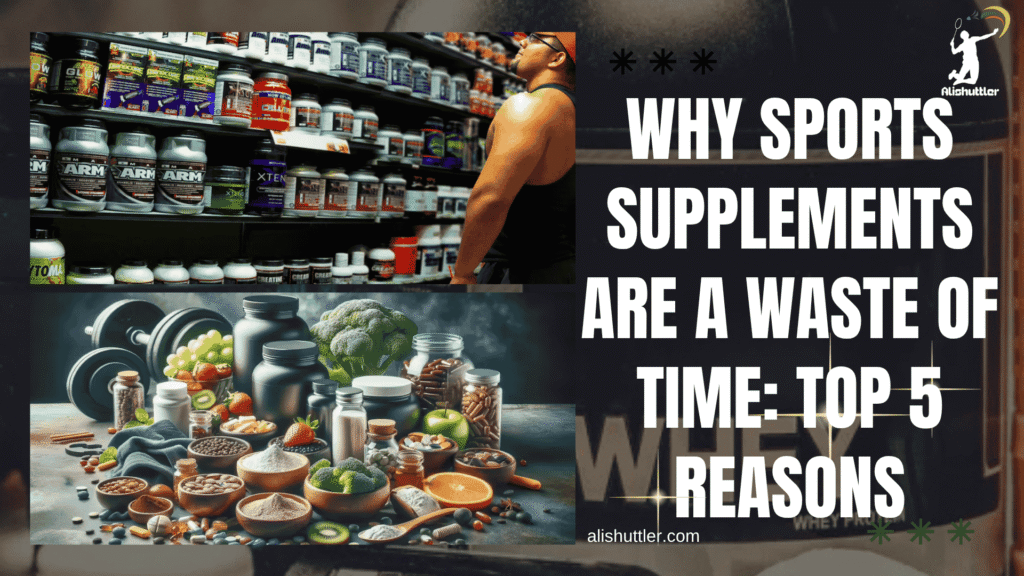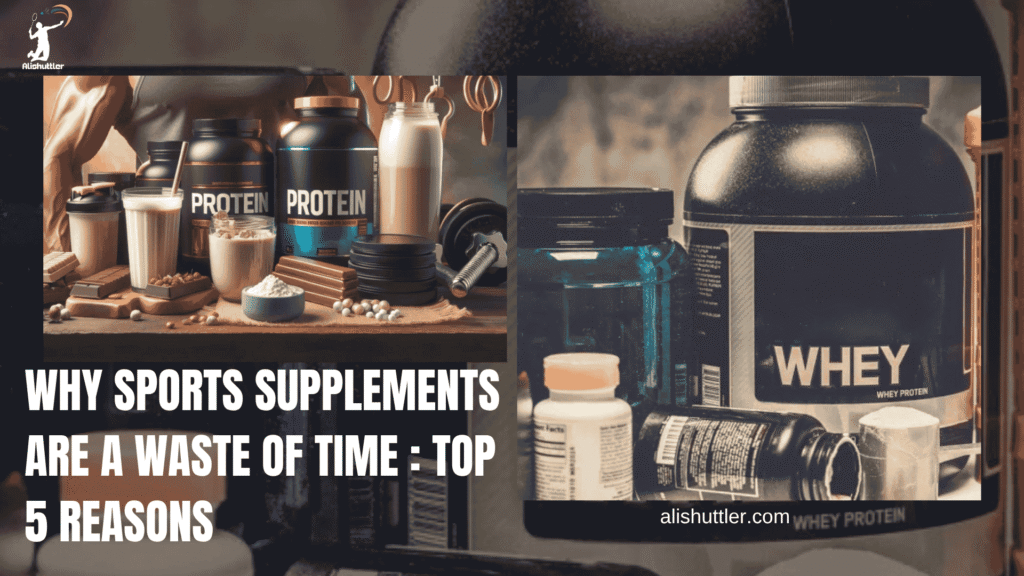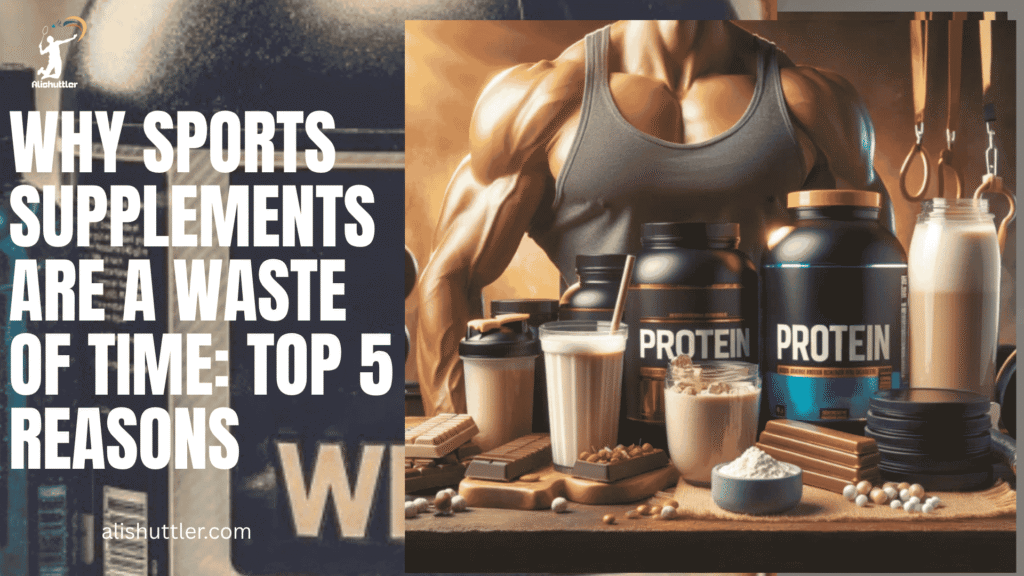Sports that a healthy diet provide sufficient nutrients for optimal health and fitness.
Like protein powders or pre-workouts, they don’t demonstrate Sports Supplements Are a Waste of Time tangible benefits for the typical individual who exercises a few times per week.
Some can even induce side effects if not taken with caution. The body examines, to some degree, what lies behind these claims and actual experiences.

Why They Fail
Sports supplements come with big promises, but most don’t live up to the hype. They have become popular all around the world, with many people purchasing them expecting to see immediate results. However, the science does not support this. Knowing why these supplements fail helps you make smarter decisions about your health and fitness.
1. Misleading Marketing
Sport supplement marketing tends to raise huge expectations of enhanced performance, rapid muscle development and increased energy. These ads rely on before and after photos, athlete endorsements, and flashy sounding testimonials with little evidence to support them. A lot of companies deploy jargon and scientific-sounding claims that baffle buyers.
Sometimes sciencey looking stuff is just marketing fluff with no substance. For instance, a supplement might be marketed as ‘clinically proven’ or ‘university tested,’ but these typically refer to small or badly designed studies that don’t demonstrate any actual advantage to the majority of users.
2. Minimal Efficacy
Heavy research demonstrates that most of the famous supplements are bullshit. No better than placebo in treadmill performance as tested in a study on citrulline. Ribose, another common supplement, has demonstrated virtually no help for exercise capacity at different doses.
Siberian ginseng, typically sold as an endurance enhancer, did not assist in carefully constructed studies lasting as long as six weeks. For elite rugby players, Tribulus terrestris did nothing for strength or muscle gain after five weeks. Not even beetroot juice, consumed every day for more than two weeks, demonstrated definitive effects.
The same for BCAAs, which failed to assist muscle or strength gains in any short-term trial as well. Most studies are small and employ differing methodologies, rendering the findings difficult to believe. Dosing is another issue—taking HMB for under two weeks or at low doses doesn’t appear to assist, and longer studies are uncommon.
3. Poor Regulation
There is almost no regulation on how supplements are produced and marketed. Health officials aren’t going to examine every batch or test every product before it hits the market. Not controlling that means there’s a risk of cross-contamination or inaccurate ingredient lists.
Customers need to hear that there’s no guarantee it is safe or good. Whole foods, in contrast, are less regulated and offer natural nutrients without these dangers.
4. Redundant Nutrients
Most sports supplements add vitamins, minerals and amino acids that most of us already get from food. For eating, a combination of fruits, vegetables, grains and protein provides more than enough nutrients for the average individual.
An overload of supplements can even throw the body out of balance, doing more damage than good. A great diet generally renders supplements irrelevant.
5. Potential Harm
Supplements can have side effects or react poorly with other medications. Over the long term, it may put you at risk for addiction or underlying medical issues. ‘Natural’ doesn’t always mean safe.
Because each individual’s health varies, any supplement ought to be consulted with a health professional beforehand.
The Scientific Reality
Scientific research on sports supplements is anything but straightforward. A lot of studies have limitations, and real world outcomes don’t necessarily live up to the hype. Knowing how research works, and knowing your own body, is the secret to making smart choices.
Flawed Studies
A lot of the research backing sports supplements isn’t as robust as it appears. Others use small cohorts that make it difficult to determine whether their findings will generalize to a larger population. Take, for example, a beta-alanine trial that may only have a few athletes participating – which can distort the mean results.
They think funding sources matter too. Studies funded by supplements firms can be slanted, as these organizations have ’emotional’ and financial investment in good outcomes. Peer review helps, but even peer-reviewed studies can overlook concealed defects or conflicts of interest.
ALWAYS seek out large, well-controlled studies that have been repeated by independent teams.
Placebo Power
Faith makes all the difference. If they believe a supplement will assist, they might experience enhancements even if the product is actually ineffective. This is the placebo effect at work, and it is well-established in sports science.
Olympians sugar-pilled might jog faster or slouch less fatigue purely because they anticipate doing so. Although this mind boost can assist, it doesn’t create actual strength or stamina. To put your faith instead in unproven nutrition or training is to risk squandering valuable time and money.
Proven things, like balanced diets and good sleep, provide more consistent returns.
Individual Response
Every individual’s body is unique. Things like genetics, diet, and lifestyle all influence supplements. One person might gain 1–2 kg of bodyweight from creatine monohydrate over the course of a month, another experiences none or close to none.
Beta-alanine can increase muscle carnosine by as much as 80% but might not enhance performance for all individuals. Some need more iron because of hard training, others don’t. Safe doses, such as 15–30 g/day of glutamine, might not be better for everyone.
I’d rather you follow your own response and consult with a professional before adding new supplements.
Science-Based Approach
Long-term gains come from demonstrated techniques. Instead of chasing trends, focus on what’s backed by real data: regular training, balanced nutrition, and enough rest.
Though 300 mg/kg bicarbonate may be beneficial in brief, maximal sports, effects tend to be small. There is not enough consensus among experts on whether it is safe or worth it to take beta-alanine for months.
Supplements such as quercetin demonstrate no side effects up to 1,000 mg/day, but no demonstrated benefits. Question audacious assertions and stick with what works.
The Financial Drain
Sports supplements are becoming an increasing global financial drain, with Americans spending in excess of $30 billion annually on dietary supplements alone. The financial drain doesn’t stop there, as recurring costs, subscription traps, and false beliefs about health benefits keep you spending. Most supplements don’t come close to delivering on their promises, and in fact, a good diet and exercise regimen can provide for the majority of needs.
Looking at the true costs versus benefits is essential to making wiser decisions.
Cost vs. Food
For most, whole foods are more nutritious than the majority of supplements. A kilo of lentils, beans, or eggs can provide the vital protein, vitamins, and minerals at a tiny fraction of the cost of the branded powders or pills.
Fresh fruits, grains, and vegetables for meal planning frequently come out less expensive than supplements here and there every month. When you look at price per gram of nutrients, whole foods come out ahead on both cost and healthfulness. Meal prepping can help cut costs even more, allowing you to buy in bulk and minimize food waste.
Consuming a variety of nutritious foods promotes long-term well-being more than most supplements are able to. Whole foods have fiber, antioxidants, and phytonutrients you won’t get in a pill. Focusing on food quality and variety will likely help with energy, immune function, and recovery in ways that short-term supplement use cannot.
Subscription Traps
Supplement subscription models are ubiquitous, mesmerizing users into a financially draining merry-go-round. These services conveniently provide a veil of amnesia with automatic renewals and pro-rated purchases bundled in.
Marketing maneuvers can convince you of an urgency, that if you miss a dose or shipment, you’ll be behind the curve. It can tempt you to buy more than you intended or require.
It’s smart to consider these deals prudently, verifying whether you really profit or simply pay for ease. For most, ditching the subscriptions and investing in real food is a smarter investment.

Others, such as local food markets or cooking classes, aren’t recurring expenses and can foster life skills.
Opportunity Cost
Dollars spent on supplements are dollars not spent on other health-oriented investments. Rather than powders or pills, you might sign up for a gym, attend a yoga class, or purchase healthier groceries. Both of these options have well-established benefits.
The real cost of supplements is what else you could be doing for your health. For most, the solution lies in nutrition and exercise, not medication.
The Psychological Trap
Sports supplements all tend to over deliver. We’re all too ready to slip into thought patterns that convince us these products are fitness lifesavers, when really, the gains come from habits, not powders or pills. Understanding the psychology and social pressures behind supplement use can help individuals establish wiser objectives and prevent unnecessary expenditures.
Perceived Need
Supplements are perceived as necessary for advancement. So many believe they can’t get there without them, due to aggressive marketing and innumerable testimonials. Ads can market the concept that if you’re missing supplements, you’re missing results, and they can make people think they’re missing something important.
It’s the idea that we’re somehow incomplete without goods. The reality is, studies indicate that the majority of the nutrients required for health and performance can be sourced from a nutritious diet. Although supplement users have more nutrient intake, it’s not necessarily healthier.
The notion that supplements are shortcuts can derail foundational habits like sleep, whole foods, and movement. To focus on strengths, to work with what you have, is more sustainable and more effective. Over time, moving from “I need this product” to “I can do this myself” helps create genuine confidence.
Fitness Identity
Supplements can be a membership pin in certain fitness circles. They can be a badge of honor, or a means to display your devotion. Such thinking can breed hubris, but it threatens to confine one’s conception of wellness to what one eats, not how one lives.
Defining yourself by Sports Supplements Are a Waste of Time use can leave on the sidelines more important parts of wellness like social support, mental health, and daily routines. At a more expansive level, movement, rest and community are as prized as what you eat or drink.
An exercise identity in which you thrive on varied, real-world habits fuels sustainable development. Groups that are about habits, not products, keep members humble and inspired for the long term. Sports Supplements Are a Waste of Time.
Distraction from Basics
When people get too caught up in Sports Supplements Are a Waste of Time, they can overlook the fundamentals. Good nutrition, exercise, and sleep provide the basis of any meaningful advances. Supplements provide the illusion of control or a shortcut, but they can distract from choices that count.
The siren call to seek magical methods is powerful, with merchandise on every shelf and screen. Trend chasing wastes time and money. Mastering key skills and habits up front makes any subsequent decisions about Sports Supplements Are a Waste of Time better informed and less prone to becoming a crutch.
Building Real Confidence Sports Supplements Are a Waste of Time
Real advancement is from developing yourself, not from developing a cart. Supplementing for drive or get-up-and-go can camouflage larger concerns such as anxiety or lack of quality sleep.
Self-reflection disrupts this cycle. Inquire what objectives count and why, and if a product actually aids in achieving them. The human psychological trap is that it’s easy to confuse piling up products with compounding skills.
What Actually Works
Sports Supplements Are a Waste of Time receive tons of hype, but constructing genuine fitness is grounded in intelligent habits and daily decisions. Let your attention remain where it earns consistent returns: nutrition, training, and recovery.
Foundational Nutrition
Whole foods provide the body with what it needs to energize and repair. These foods provide vitamins, minerals and fiber that most Sports Supplements Are a Waste of Time simply can’t compete with. Consuming a variety of foods each day satisfies requirements for iron, calcium, potassium and other micronutrients.
Planning meals and prepping in advance can help keep your macros in check. For instance, consuming a combination of carbohydrates, protein, and fats with every meal can maintain energy levels and provide muscles with what they need to grow.
Drinking sufficient water is important. Being even a little dehydrated can slow reaction times, induce fatigue, and reduce performance. For most of you, a balanced diet and water will suffice. Sports Supplements Are a Waste of Time.
Nutrition education rewards over time. A little reading on labels or a chat with a registered dietitian can help separate fact from fiction. Protein powder and creatine can help, particularly after hard workouts, but protein from food (eggs, fish, or beans) is both effective and safe for most.
Around 20 grams of protein within two hours of exercising can aid your muscles in recovering. Creatine works best in modest daily doses, but looking for third-party tested brands is the key to safety.
Strategic Training
A great exercise program begins with objectives and candid self-examination. Ability-and-aim-matched training runs longer, lifts heavier, moves faster lays the groundwork for improvement.
A routine with a blend of cardio, strength and mobility work keeps results from flat-lining. It can stave off boredom and plateaus. Mixing exercise order, intensity or type keeps muscles guessing and motivation high.
Clear, achievable goals help track gains, like running a 5k or hitting a certain lift. For those uncertain about where to begin, a certified trainer will design a plan that’s safe and customized.
Prioritize Recovery Sports Supplements Are a Waste of Time
Rest is underrated but it’s what allows your muscles to grow and your injuries to heal. Without pauses, the potential for burnout or strain increases.
Stretching after workouts, incorporating a foam roller and sleeping 7+ hours most nights all aid in better recovery. Listening to the body is pivotal. Soreness, fatigue, or mood dips mean it’s time to slow or rest.
Rest days belong in every schedule, not as a reward or afterthought. This allows gains to stick and performance to improve. Sports Supplements Are a Waste of Time.
Sports Supplements Are a Waste of Time Use
Protein and creatine do help, but ONLY when used smart. Caffeine can provide quick jolts, but in excess it causes jitters and insomnia.
Most pre-workout mixes don’t do a lot unless taken persistently. Be sure to check for third-party testing to ensure what’s in the bottle is what’s on the label.
The Exceptions
Not every Sports Supplements Are a Waste of Time. Others require them particularly when individuals confront actual gaps or specific needs. It’s key to understand when a supplement is helpful, and when it isn’t.
Clinical Deficiencies
Iron, vitamin D and vitamin B12 are among the more common deficiencies among the general population, particularly in specific demographics. Deficiency can cause fatigue, poor bone health or nerve problems. Sports Supplements Are a Waste of Time may assist, but only if a genuine issue is identified.
Testing should be a requirement before resorting to supplementing for deficiencies. As we know, self-diagnosis leads to the wrong supplement, or worse, too much. Blood work and a full check-up by a doctor or dietitian ensure the selection is safe.
If you can manage it, dietary changes should lead the way. For instance, more fish for omega-3 or more green veggies for iron. Occasionally, food just isn’t sufficient or feasible, particularly for medical conditions or rigorous diets.
Physicians and RD’s are a huge part of this. They assist in testing, diagnosing, and selecting the appropriate dose and type of supplement, ensuring it suits the individual’s requirements.
Elite Athletes Sports Supplements Are a Waste of Time
Elite athletes have needs that most people do not. Their training is high, and their bodies require more calories to keep up. Supplements such as creatine monohydrate, caffeine or protein powder are employed here, but cautiously.
Creatine is among the rare proven helpers. It fires up energy in short, intense bursts, assists in muscle building, and recovery. Getting sufficient creatine from food is difficult—one would have to consume roughly 9 kilograms of meat for equivalent effects as a daily dose of creatine monohydrate.
Protein powder gets athletes the 25–30 grams needed post-hard training for muscle repair, particularly when whole foods are not convenient. Caffeine, pre-training, can provide a short-term lift as well.
Expert advice is crucial. Sports dietitians help plan when and how to supplement safely. They screen for banned substances, because elite sport has rules. Even with supplementation, the foundation remains a balanced diet, quality training, and sufficient rest.
Yet, most supplements such as “fat burners” provide nothing beyond the hype and are a waste of time and money.
Specific Diets
Vegan, vegetarian or very low calorie diets can cause holes in important nutrients, such as vitamin B12, iron or omega 3’s. Individuals with food allergies or sensitivities could leave some nutrients out.
Sports Supplements Are a Waste of Time should plug these holes, but only after a cautious glance at what’s lacking. Temporary use is optimal, as you’re trying to eat better.
It aids to consult a dietitian or nutritionist. They’ll notice what’s absent and strategize meal plans to reduce the requirement for pills or powders.

Whole foods are optimal, but supplements have their role when requirements can’t be fulfilled otherwise.
Final Thoughts on Sports Supplements Are a Waste of Time
Sports supplements are pretty on the shelf, but few do much for real gains. A lot of research supports this, and most folks experience minimal difference after extended use. Cash burns quick, hope dies slower. Real results come from smart food, consistent motion, and sufficient sleep.
There are some edge cases, but most don’t require fancy pills or shakes. Consider fruits and vegetables, hydration, and quality sleep your foundation. For you still curious, chat with a health pro before purchasing anything new. Stay keen, make it simple and find what fits you. For more tips and tales, read our guides or share your own take below.
Frequently Asked Questions
Are most sports supplements effective?
Most sports supplements don’t work. Scientific studies frequently show minimal or no advantage for the general individual. Natural nutrition and training typically trump.
Can sports supplements replace a balanced diet?
No, sports supplements cannot substitute for a balanced diet. Whole foods deliver nutrients, fiber and benefits that supplements simply can’t. A balanced diet is optimal for health and performance.
Are sports supplements safe to use?
Not every sports supplement is safe. Others have unregulated or banned substances in them. Do your due-diligence always check labels and speak to a quality healthcare professional before using any supplement.
Is spending money on sports supplements worth it?
For the vast majority, sports supplements are a waste. The gains are marginal and a healthy diet is more than adequate to satisfy the body’s appetite for much less money.
What are the risks of relying on sports supplements?
Sports supplements will make you sick, waste your money, and leave you frustrated. They can detract from good habits such as good nutrition and exercise.
When are sports supplements actually helpful?
Sports supplements can come to the aid in edge cases, like elite athletes with edge needs or medical deficiencies. For most people, supplements are almost never needed.
What should I do instead of using sports supplements?
Concentrate on eating right, training, sleeping enough and drinking plenty of water. These are the time-tested science-backed techniques to increase your athletic ability and your health. Supplements are seldom a shortcut.






